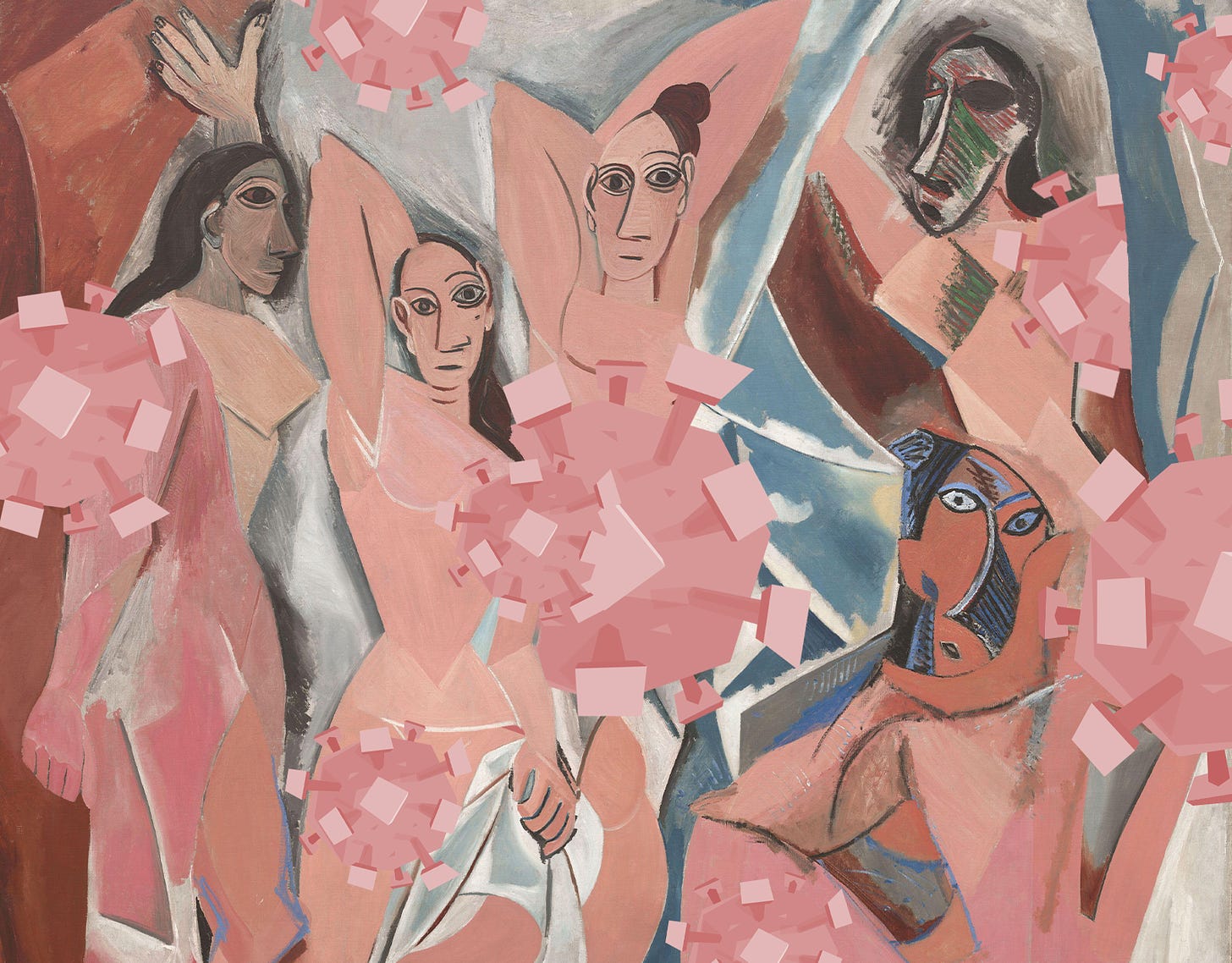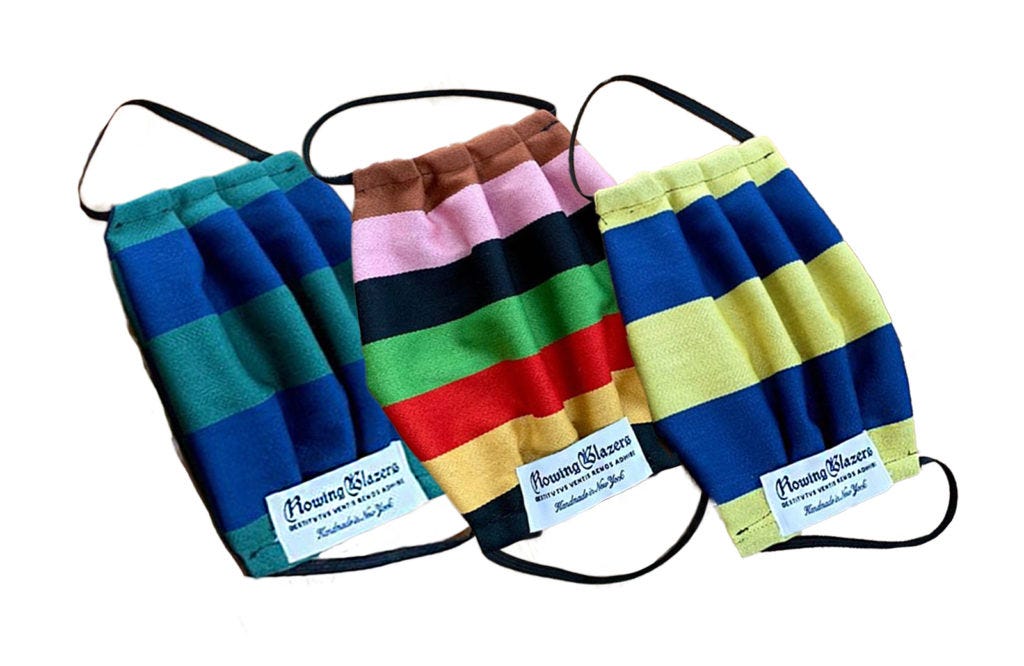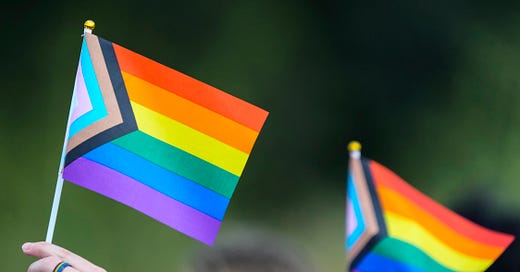
Our Masks, Ourselves
Meet the creators who are preserving the spirit of American individualism as mask culture goes global.

The botched initial guidance from the CDC and the surgeon general has finally come around to what now seems like common sense: everybody should be wearing masks. Now that everyone, besides the president, is on the same page there is a rush to find and make masks en masse. New York governor Andrew Cuomo implored those with the ability to sew to make masks, and has gone so far as to issue an executive order that essential businesses still open must supply their employees with masks as well as an order that everyone must wear a covering in public.
High fashion houses are being praised for turning their factories over to help meet the need. Sustainable-fashion poster-child Reformation has partnered with the city of Los Angeles to keep up with L.A.’s demand. When the CDC recommendation changed, Reformation received almost 175,000 orders for masks and now has a waitlist—and has published its manufacturing specs. Next week, RowingBlazers, a New York apparel retailer that is also focused on sustainability, and is in the center of the American epidemic, will be releasing its own non-medical-grade masks to donate to workers at the city’s food banks.
“This seemed like a no-brainer,” Jack Carlson, RowingBlazers’s founder told me over Instagram. “It’s taken a while to be able to get our workshop set up to do this in a way where we know everyone is safe and following best practice, but now we’re ready to go.” He says the masks will be made in New York and also available for purchase online—a portion of the proceeds will be donated as well.
But it’s not just established clothing retailers who are answering the growing demand. Seamstresses across the country have taken up the cause. And as masks sell out at Walmart and on Amazon, there is still one place online you can find them: Etsy. There were over 2 million searches for face masks on Etsy the weekend of April 4-6 alone. “Our sellers are able to produce hundreds of thousands of masks per day,” Etsy CEO Josh Silverman told CNBC, noting that there are now roughly 20,000 storefronts on the site making and selling masks. The e-commerce site has proactively posted guidelines for sellers as well as a warning banner for customers stating that items sold on Etsy are not medical-grade and linking to a full page of guidance on COVID-19 safety.
Etsy’s reputation is associated with DIY for housewives and hobbyists, as though it is somehow artistically and commercially inferior—driven in part by the sexist notion that women’s fiber arts are merely crafts while the fine arts are the domain of men. In reality, Etsy is a dynamic platform for a multitude of artisans. According to Etsy’s 2016 diversity report, almost 9 out of 10 sellers on the site are women. Today, those predominantly female creators are turning their skills and creativity toward making an astonishing array of masks for the greater good.
In Louisiana, where there have already been more than 1,100 COVID-19 deaths, Etsy seamstress LaMonica Detiege-Hagans lives on the West Bank of the Mississippi in Marrero, just outside New Orleans. She was a nursing assistant before a career change and, seeing the need in Louisiana, she went to renew her license but found that her certification had expired in January. “I couldn’t help that way, so I decided to help some other way,” she told me in a phone interview. She has been sewing since 1999 and has even won awards for her work. Detiege-Hagans has for years had an Etsy storefront selling homemade baby products, and when the virus hit she started selling masks. “I also donate masks to local hospitals, nursing homes, and staff.” For her, making masks is about both protecting people and giving people a personal touch of style—with custom patterns ranging from pink kente to black and gold fleur de lis.
There is a long history of artists using masks to evolve: Picasso’s appropriation of African masks was a catalyst for Cubism, which helped break Western art away from realism and paved the way for futurism and abstract expressionism. It cannot be overstated how monumental this shift was in art history. So, too, may be the shift in Western and American culture as we face the imperative to don masks. And that shift will be facilitated by the labor of women.
With masks come the forfeiture of individual identity for the safety of the wider community. In parts of Asia, wearing surgical masks has been accepted in daily life since at least the 2003 SARS outbreak. “Mask-wearing tends to be widespread in countries that view disease outbreaks with the gravity that comes from firsthand experience with the horror of an epidemic,” writes Uri Friedman in the Atlantic. The stigma of wearing a mask in America, and the xenophobia often associated with that stigma, may, Friedman suggests, start to dissipate because of the coronavirus pandemic.
The unavailability of medical-grade masks, while partly a symptom of government incompetence, also shows that people are taking the need to protect themselves and others seriously. But what will happen when things start to calm down and people will assume we are through the worst and can go back to business as normal? If the CDC’s discrepancies about when we should have started wearing masks are any indication, the guidance on when to stop may well be uncertain and unclear. The best we can do in the indefinite meantime is to adopt mask culture.
So how do you move a culture entrenched in the worship of the individual to take a long-term altruistic collective action? This is the genius of the Etsy marketplace and radical customization.
Kelsey from Pennsylvania, whose husband lost his job due to the coronavirus shutdowns, had just set up her Etsy store a few months ago, not knowing what was coming. “We were following the news and I thought, they’re going to make us all wear masks,” she told me. “And I know I personally hate the idea of wearing an ugly surgical mask and they were in such short supply, so I decided to make a few.” There have been more sales than she expected, and her family has been able to make up for some of its lost income. After initially running out of fabric because of the high demand, over the past few weeks, Kelsey has been able to add new patterns and designs to her shop, including galaxy prints, marbled tie-dye, and lots of floral styles.
“If we were all more considerate and everyone wore masks we could help stop [the pandemic],” Kelsey said. “I was hoping if I put pretty ones out there that it would encourage people and make it normal.”
Even prior to the surge in the need for medical-grade masks, there were a number of communities where masks were already prevalent. Etsy storefronts for ravers and Burners—Burning Man enthusiasts—have long been producing masks for festivals that pride the expression of individuality in tandem with protection from desert dust. The offerings range from masks featuring LEDs to others made of holographic fabric. They show how masks, even with a functional purpose, can still be a way to declare identity and personality. You can even get a medieval plague doctor mask if you so desire.
In New York, Alice Ritter started her Etsy after making jackets for her daughter to wear while DJing. But since the coronavirus has taken hold of the city, she has shifted her attention and resources to making masks. “I came up with the idea of #HELPFROMHOME, buy one fashion mask and I'll donate 15 to hospitals,” she said. “The one thing that just started running through my mind is, how will this impact the future of how we put ourselves together (does my mask match my outfit—do I look stupid and boring, or how hot do I look in rainbow sequins?).”
Angela Frost in Ventura, California had been in the apparel and garment-dyeing industry for years selling hand-dyed silks and ribbons on Etsy. The site “put out an email saying if you can make masks we’re going to have a huge demand,” she told me. “Whenever you’re in a creative environment and you want to make something that’s different. You try to make what is mandatory something that allows people to have creative expression and not just to be lost in a sea of generic blue surgical masks.” She expressed a sense of urgency after recounting her recent experience in fulfilling orders. “The desperateness I hear in people’s voices to get these, I didn’t realize people were having a hard time finding them. I feel a real sense of responsibility to get these to people.”
Another impediment for American culture when confronting the shift to a mask culture is racism. Given the history and significance of Les Demoiselles d’Avignon—the Picasso painting that famously deformed women’s faces into geometric shapes modeled after African masks—it is especially ironic and tragic that some people of color worry about reclaiming and incorporating the mask tradition into modern-day fashion. The hostility encountered by black men in America is singular, and the need to wear masks because of COVID-19 puts them in a double-bind: The disease is killing African Americans at higher rates than the general population, but wearing a mask puts black men at risk of greater social scrutiny, or drawing uncalled-for police attention, which often means police antagonism.
The fear resulting from the dismal state of American police’s relationship with African Americans is well documented and widely reported. “For me,” writes Aaron Thomas in the Boston Globe, “the fear of being mistaken for an armed robber or assailant is greater than the fear of contracting COVID-19.” It remains to be seen whether a new paradigm in which masks are widespread and culturally accepted will be one in which that fear diminishes.
Still, the “artisanal troops” of Etsy are embracing an illegitimi non carborundum—‘don’t let the bastards grind you down’—attitude in their efforts to supply masks with artistic patterns that allow the wearer to feel safe and still assert an independent identity—or simply use the mask as a fashion statement.
“All of us are like threads in the fabric, it takes all of us to weave together the story,” says Rickeysha Godfrey, a Howard Law grad who now lives in Florida. She opened an Etsy store after the birth of her daughter. At the start of the outbreak, she initially was only planning to make masks to protect her family, many of whom are battling cancer and immunocompromised. But, through word of mouth, her store has been inundated with demand—Godfrey and I spoke after she had been up all night sewing masks to send to people in need. “I tried to find unique fabrics and textiles, I like to make people feel special,” she said. “When people have something handmade, one to one, I think that it really does make a difference.”
And as a black woman, she’s knows how discrimination works against people of color in masks especially. “[Americans] are naturally suspicious of people, and we’re not naturally accepting of people who are other,” Godfrey said. “Now with the masks, that is going to be magnified. It’s removing a key way we judge people, not being able to see the way they smile.” She’s most worried for her brothers and has made masks for them that she hopes will protect them from both unwarranted prejudice and the virus. “We’re very conscious of how we present in public, and I’m always worried for my brothers. I tried to make masks for them with a lighthearted design and brighter colors to throw off perceived intimidation.”
Still, she sees the coronavirus crisis as an opportunity to lift each other up—and custom masks as a way to do that. “As a black creator, I’m encouraging people to share their natural creative gifts,” she said. “When I’m thinking about making something, I lead with that. I lead with what is going to be my contribution and how can I make my stuff different. Because everybody is making masks now.” It’s that spirit of innovation and generative grace that will help push American culture forward and through the coronavirus crisis. “How can I add a little razzle-dazzle of blackness to this regular thing, now it’s a celebration of my culture.”
There is still so much we don’t know about the coronavirus and what its lasting effects will look like. But at the bare minimum, we know that masks are part of establishing a defense against the unknown and that we don’t have to sacrifice our individuality to do so.
“Artistic expression is the main reason for creating the products we place in our shop,” Jay of Day One Luxury in New York City told me over email. “Our masks are for all people no matter what color or lifestyle.” His shop’s best-selling masks feature blue and red bandana-styled options. He also views making custom masks to be uplifting. “At this time we feel isolated,” he said, “so wearing a custom mask can be another way to express yourself and feel free.”











